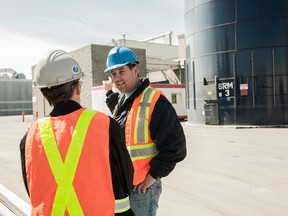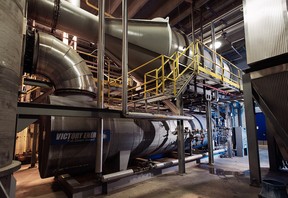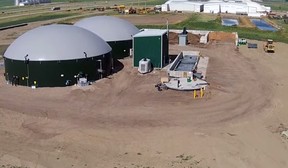High-tech finesse expands capability to do more with less

Article content
Albertans are embracing a circular economy, a business framework that reduces waste, pollution and energy use while reducing reliance on new resources. Some of the technology required to push the needle toward the circular economic model already exists — but Alberta businesses are pushing the limits of zero waste operations using high-tech control systems.
Advertisement 2
Article content
For example, West Coast Reduction Ltd. (WCRL) operates three zero-waste rendering plants in Alberta — in Calgary, Edmonton and Lethbridge — which primarily serve the beef and pork industry. Once edible protein has been prepared for market, the company applies heat to transform the inedible 40 to 50 per cent of the livestock into usable products: fats and oils to be used as feedstock for biofuels, protein meal for animal and pet food, and raw material for fertilizer.
Article content
“It’s essentially an industrial-scale, high-tech kitchen,” says Jared Girman, director of government relations and strategic initiatives with WCRL. “By optimizing the system, we can sell 100 per cent of what we process and reuse all of the water we extract in our processing.”
Advertisement 3
Article content
WCRL is currently looking to produce its own fuel onsite from a range of sources, including manure, used cooking oil, restaurant grease and meat trimmings.
“That would make our operations energy neutral,” says Girman.

Innovators in Alberta’s agricultural sector are working toward similar goals. The mission statement of the Perry Family Farm, located just east of Lethbridge, is to “produce perfect potatoes.” But its long-term goal is to demonstrate leadership in sustainable wealth creation by integrating agriculture and energy production.
Its GrowTEC operation features an anaerobic digester, commissioned in 2014, which harnesses bacteria to break down organic waste to produce biogas. That gas fuels a combined heat and power unit that has generated more than 4,000 megawatt hours of electricity each year since 2016.
Advertisement 4
Article content
“In farm country, we can utilize organic feedstock ranging from potato cull to manure, not only from our own farm, but from the surrounding area,” says company president Chris Perry, who operates the farm with his brother.

In the process, the farm reduces the production of greenhouse gases, achieves energy independence, generates heat to purify potato wash water and creates fertilizer to nourish the soil.
The Perry farm is looking for partners to help optimize the tech behind the system to create a replicable and exportable model for agriculture.
However, as carbon credits increase in value, the GrowTEC business model is attracting additional attention.
“Adding up the number of calls we’ve made in the past eight years to potential customers for carbon credits, we’ve seen that many calls returned in just the last six months or so,” Perry says. “Our operations are just a small part of the renewable energy equation, but we believe we’re developing a made-in-Alberta success story.”
This story was created by Content Works, Postmedia’s commercial content division.
Full circle: Alberta businesses embrace the circular economy - Edmonton Journal
Read More
No comments:
Post a Comment